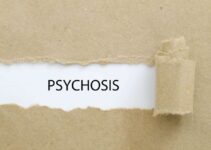About 13% of new mothers suffer from postpartum anxiety, yet most people are not aware of the symptoms and most cases are ignored. In this article we explain what postpartum anxiety is, what the risk factors and symptoms are, and how to get treatment.
Skip to the section that interests you or keep reading.
Table of Contents
What is postpartum anxiety?
The emotional and physical trauma of childbirth can, in some cases, trigger the onset of extreme anxiety. When your inner fears and worries can get the better of you. When they can get out of hand.
This is what medical professionals call postpartum anxiety.
But anxiety isn’t an all or nothing response. It is not black and white. It is continuum, a scale from low to high with every feeling in between.
All new mothers have fears, worries, concerns about the well-being of their baby. But at some point you might find yourself operating at the higher end of this anxiety scale. Behaving in a way where the feelings of anxiety are so great that they start to be detrimental to your health.
But because anxiety is a scale, it is sometimes difficult to determine when the anxiety has become “too much”. It is also why postpartum anxiety often goes by unnoticed which is why you may find yourself struggling alone, unaided. And sometimes with the additional heartache of accusations that you are just being a “neurotic” mum and that you should just “calm down” and “stop worrying so much”.
But you can’t. Your fear system is on hyperdrive. Your brain has become primed to only notice and remember the bad and fearful aspects of every experience, rather than the good and safe. And you are no longer experiencing the kind of worries which you can push to the back of your mind. The worries are uncontrollable. They are taking over. And you may need some kind of support or therapeutic intervention to help stabilize your thinking.
In addition, there are different types of anxiety. Different experiences. Sometimes you can have flashbacks, sometimes panic attacks, sometimes compulsive behaviours, or sometimes periods of intense worry, irritability and restlessness. Assessments by a medical professional involve the use of specific questioning to help them measure the anxious feelings in an objective, controlled fashion, and to work out what are the next steps to take on a case by case basis.
Why does it happen? The possible risk factors.
Although there is only limited research on the prevalence of postpartum anxiety, some scientists estimate that anxious feelings reach this high “out of control” level in about 6-8% of births. It is also much more prevalent in people who have shown symptoms of high-anxiety in the past (estimated to be about 5-10% of the global population). And it is these individuals who are particularly “vulnerable” to postpartum anxiety and who will be especially sensitive to the following risk factors:
- A stressful environment. One of the risk factors for developing postpartum anxiety is being exposed to a stressful situation or environment. There is no doubting that the act of giving birth and finding yourself caring for a newborn baby is incredibly stressful for most new moms – the expectations, the sleep deprivation, and the emotional demands.
- Uncontrollability. Another factor which contributes to feelings of anxiety is the feeling of not being in control. Some scientists have shown that there is a relationship between feeling overwhelmed and out of control with feelings of anxiety.
- Traumatic birth experience. Going through a traumatic birth experience with medical complications, or giving birth prematurely, can, in some cases, lead to post traumatic stress disorder (PTSD) – a specific type of anxiety disorder where you experience emotional flashbacks about the birth experience.
- Cortisol. Cortisol, the chemical most often associated with stress (but also involved in other body functions such as physically readying you for the day ahead) is present at higher levels during pregnancy and at the beginning of the postpartum period. Because anxiety symptoms and stress often co-occur with increased cortisol levels, this elevated level of cortisol may be a contributing factor.
- Panic Disorder & Obsessive Compulsive disorder (OCD). As well as individuals with general anxiety, Individuals who have previously suffered from panic attacks or OCD – two anxiety related disorders – may be more susceptible to postpartum anxiety.
- Postnatal Depression. If you suffer from postnatal depression, you are also more likely to suffer from postnatal anxiety. They co-present themselves in a significant proportion of cases.
- Age. Anxiety disorders most frequently manifest themselves when you are in your 20s which is often the age at which many individuals are starting to have a family.
- Poor social support. Marital/relationship distress and an absence of social support have been suggested, in some instances, to be a contributing factor in the development of postpartum problems such as depression and anxiety.
What are the symptoms?
From a medical perspective, there are a specific set of standardized behaviours which you have to display to be classed as having anxiety from a medical perspective. The particular array of behaviours depend on the particular form(s) of anxiety that you might experience. Although many of the symptoms may be “typical” of motherhood, it is the frequency, duration or strength of these feelings that determines whether you have postpartum anxiety.
- General anxiety symptoms. These include symptoms such as poor concentration, muscle tension, fatigue, and restlessness.
- Obsessively worrying that your baby may come to harm. Another symptom may be obsessing that you (or others) may intentionally or accidentally harm your baby. This can cause you to perform repetitive checking behaviors to make sure your baby is alive and well. In more severe cases, mothers can sometimes refuse to care for their child for fear that they might hurt them, or, in contrast, avoid any event which may cause them to be separated from their child.
- Obsessing about cleanliness. Another common obsession that moms with postpartum anxiety can have is that their baby will become contaminated with germs. This obsession often leads to compulsive cleaning (e.g. hand-washing) as a way to try to “overcome” this obsession.
- Having Panic Attacks. Symptoms of panic attacks typically include shortness of breath, heart palpitations, chest pain, dizziness, fear of losing control or dying. Panic attacks usually appear very suddenly, can recur, and are unpredictable. Their unpredictability creates yet more anxiety about when the next one may arise, stopping new moms engaging in social groups which may have otherwise provided much needed emotional support.
- Having Flashbacks. Post traumatic stress disorder – the type of anxiety associated with experiencing a traumatic event – can generate symptoms of intense fear, helplessness, or horror. These are often accompanied by flashbacks of the traumatic event, distressing dreams of the event, emotional numbness, irritability, or difficulty sleeping and concentrating.
How do I get help?
One of the difficulties with postpartum anxiety is knowing whether your anxious thoughts are “normal”. How do you know that the anxiety you are feeling is greater or different from other moms?
Talking to other moms within your safe social circle of friends and family can sometimes help you answer this question to some degree. Sharing experiences and feelings. Opening up and describing the kind of thoughts you have. And finding out more about their own feelings. Whether they are the same as yours.
But is not always easy to talk about these kinds of thoughts and feelings even with close family and friends. And even if you do open up, not everyone will feel comfortable doing the same. It takes real bravery to talk about your fears. True courage.
And this is why you might turn to your midwife, health advisor or a medical professional to listen to you.
Don’t be afraid to do so.
One of the characteristics of postpartum anxiety (unlike postpartum psychosis) is that moms usually have a good awareness of their worries, obsessions, panic episodes and so being honest about the full extent of your symptoms will help them make an accurate assessment of your mental state, and get you the help and support you might need.
How do I help someone who I think might have postpartum anxiety?
If you think that someone you know might be suffering from postpartum anxiety then what they may need most is encouragement, courage, to speak up. To talk to someone about it. And ideally to a medical professional.
It is good to remember that this person is in an anxious state of mind, where their fear response is hyperactive, so even considering seeking help may create extra worries, making the decision to do so even more difficult. Fears such as being thought of as a neurotic mum who over-worries may stop people talking to a medical professional because of the fear that their concerns may be ridiculed or dismissed.
Listen to them. Encourage them to be open and honest about their experiences and feelings. Acknowledge them as real. Show them that you care. As the saying goes, love conquers fear.
All these things may help them overcome the anxiety of speaking to their midwife or doctor – something you can try and encourage them to do. Because only by seeking help, can they start to receive the necessary therapeutic support they need to become better at controlling, and overcoming, their inner anxieties.
How do I get better?
The particular type of treatment that you may receive depends on the particular symptoms that you display. There are a few different options which may be offered to you.
- Cognitive-behavioral therapy (CBT). CBT is one of most common ways to treat anxiety (and depression). It is, in essence, a type of talking therapy that can help you manage your anxiety by changing the way you think and behave. As part of the therapy, you often break down the worries into smaller parts to deal with each small part in turn, rather than tackle the whole issue at once. It also offers practical ways to help you think more positively (rather than fearfully) within your daily routine.
- Medication. This can include Selective Serotonin Reuptake Inhibitors (SSRIs) which are often used to treat the more depressive symptoms which can co-occur with anxiety; Benzodiazepines which are a sedative, and anti-anxiety medication; and Imipramine which is an anti-panic medication. As with all medications used within the postnatal period, the risks and benefits will be weighed up, especially in relation to your ability to continue breastfeeding your baby if you wish.
- Lifestyle recommendations. These can include the elimination of caffeine and relaxation techniques.
- Critical event debriefing. This is a particular prevention treatment for PTSD which involves talking about the traumatic experience with a trained professional. However, the way this debriefing is done can influence how successful (or harmful) it is. Evidence suggests that one of the best approaches for preventing PTSD is a face-to-face debriefing in the immediate postpartum period, followed by further counseling (e.g. over the telephone) at intervals during the subsequent postpartum period (e.g. 4-6 weeks). A single debriefing session immediately following the traumatic event is often ineffective in preventing PTSD and may, in fact, cause harm.
What about the next baby?
The experience of postpartum anxiety can become an imagined barrier which makes you fearful of having another baby.
But it doesn’t have to be.
Anxiety is something that is well understood in the medical world and the non-invasive treatment options are readily available.
The key is starting to prepare early. During your pregnancy before the baby even arrives.
By talking honestly to your midwife about your previous postnatal experiences, they can work with you to put together a plan which means that you receive the support you need. As anxiety sometimes even starts to arise even before childbirth, it is important to start this process as early as possible.
And although these preparations won’t necessarily stop the anxiety returning next time, it can provide some much-needed comfort and reassurance to know that the support is right there, if or when the fear get too much.
Further Reading
Anxiety Disorders During Pregnancy and the Postpartum Period by Lori Ross, & Linda McLean, (2006). The Journal Of Clinical Psychiatry, 67(08), 1285-1298.








I have recovered my postpartum anxiety with the help of an organic tea supplement called Relaxing mama stress reducing tea by secrets of tea.